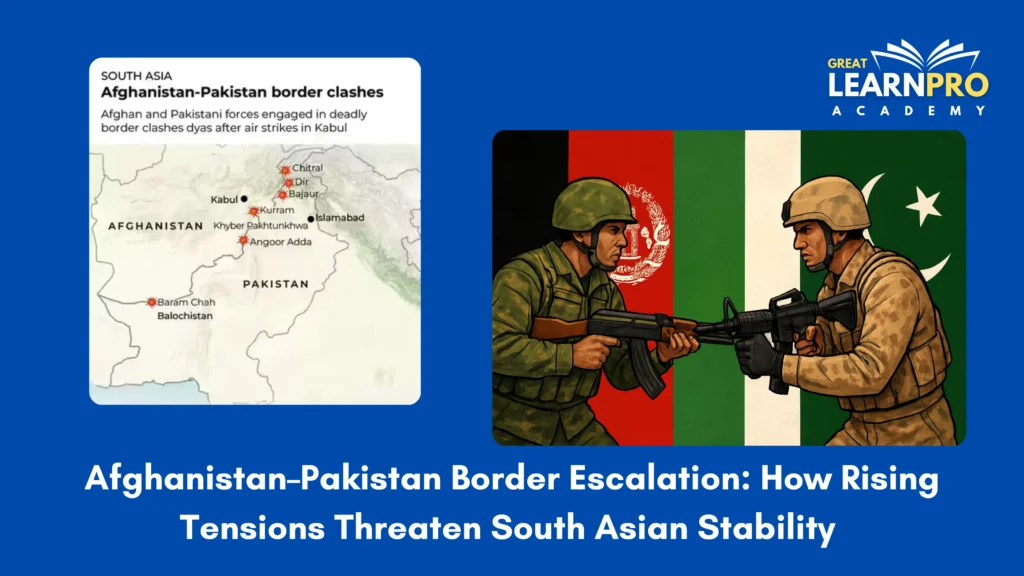The tension between Afghanistan and Pakistan has once again escalated into a major regional concern in South Asia. What was once a dispute rooted in colonial boundaries has evolved into a multidimensional conflict involving terrorism, border sovereignty, and strategic rivalries. The issue is not just bilateral anymore; it now influences the wider stability of the subcontinent, including India’s security and geopolitical interests.

Historical Background
The seeds of the conflict lie in the demarcation of the Durand Line in 1893 by British India, which split ethnic Pashtun communities between Afghanistan and what later became Pakistan. Successive Afghan governments have refused to recognize this line as the official boundary, viewing it as a colonial imposition that divided their people. Pakistan, on the other hand, treats the Durand Line as an international border and has fortified it to control cross-border movement.
Ethnic and historical grievances were later compounded by political developments. During the Cold War, Pakistan became a frontline ally of the United States in supporting the Afghan Mujahideen against the Soviet invasion. After the fall of the Taliban in 2001 and the U.S.-led intervention, Pakistan’s policy of maintaining influence in Afghanistan — often through militant proxies — created enduring mistrust between the two countries.
Recent Escalations
In recent years, the border conflict has intensified. In 2025, Pakistan launched airstrikes inside Afghan territory, claiming to target members of the Tehrik-e-Taliban Pakistan (TTP), a militant group that Islamabad accuses the Afghan Taliban of sheltering. Kabul responded by accusing Pakistan of violating its sovereignty and reported civilian casualties. Frequent exchanges of fire, the closure of key border points like Torkham and Spin Boldak, and mutual accusations of harboring terrorists have led to a dangerous cycle of retaliation.
The Afghan government insists that Pakistan uses military force to assert dominance and undermine its autonomy, while Pakistan argues that Afghanistan’s inability to control militant networks threatens its internal security. The situation worsened when Pakistan began deporting thousands of Afghan refugees, many of whom had lived there for decades, leading to humanitarian distress and anger in Afghanistan.
Strategic and Humanitarian Implications
The consequences of this conflict go beyond border skirmishes. It has disrupted regional trade, cut off vital humanitarian supply routes for landlocked Afghanistan, and deepened its economic isolation. Thousands of trucks have been stranded at the borders, and cross-border communities are facing severe shortages of essentials.
From a security standpoint, the resurgence of militant groups in Afghanistan poses a direct threat to Pakistan’s internal stability, especially in its Khyber Pakhtunkhwa and Balochistan provinces. The re-emergence of extremist groups could also have spillover effects in Central and South Asia, reviving fears of terrorism across the region.
Impact on India
India, a close observer of the Afghanistan–Pakistan dynamic, faces both strategic risks and opportunities due to these tensions.
First, instability in Afghanistan reduces India’s ability to engage economically and diplomatically with Kabul especially since India has invested heavily in Afghan infrastructure, education, and humanitarian aid since 2001. Projects like the Zaranj–Delaram Highway, which connects Afghanistan to Iran’s Chabahar Port, were part of India’s strategy to provide Afghanistan an alternative to Pakistani trade routes. Renewed violence now threatens those long-term investments and limits India’s access to Central Asian markets.
Second, a hostile and unstable Afghanistan could push Pakistan to reassert influence through militant groups, which indirectly affects India’s security situation in Jammu & Kashmir. A rise in cross-border militancy or radicalization in the region could have repercussions for India’s internal security apparatus.
Third, the geopolitical dimension is significant. As Afghanistan tilts closer to China and Pakistan through the China-Pakistan Economic Corridor (CPEC) and Beijing’s outreach to the Taliban, India faces the risk of being strategically encircled. This China–Pakistan–Afghanistan alignment could constrain India’s role in regional connectivity initiatives, such as the International North-South Transport Corridor (INSTC).
However, the situation also provides an opportunity for India to strengthen ties with other regional players particularly Iran, the Central Asian Republics, and Russia to create a counterbalance to the growing Pakistan-China influence in Afghanistan. India’s diplomatic engagement, including humanitarian assistance and people-to-people cooperation, can also help sustain its goodwill among Afghan citizens.
Way Forward
For lasting peace, Afghanistan and Pakistan need to institutionalize border management, curb militant activities, and engage in constructive dialogue with regional support. Confidence-building measures, joint anti-terrorism mechanisms, and a clear demarcation of sovereign responsibilities are essential steps.
Regional organizations such as SAARC and SCO could play a mediating role, but their success depends on genuine political will from both sides. The international community, especially India and China, must encourage de-escalation and prioritize humanitarian stability over geopolitical competition.
Conclusion
The Afghanistan–Pakistan issue is not a localized border dispute but a complex web of historical grievances, ideological conflicts, and power rivalries that affect the entire South Asian region. For India, this evolving situation presents a strategic challenge that must be handled through balanced diplomacy, regional partnerships, and sustained humanitarian engagement. Peace between Afghanistan and Pakistan is not only crucial for their own people but also for the stability and prosperity of the whole subcontinent.
Sources:
- https://www.reuters.com/world/asia-pacific/pakistan-closes-border-with-afghanistan-following-exchanges-fire-2025-10-12/?utm_
- https://timesofindia.indiatimes.com/world/south-asia/1200-border-breaches-712-airspace-incursions-afghanistan-cites-years-of-pakistani-aggression-asserts-right-to-self-defence/articleshow/124666317.cms?utm_
- https://www.lemonde.fr/en/international/article/2025/10/14/the-rivalry-between-new-delhi-and-islamabad-underpins-border-clashes-between-pakistan-and-afghanistan_6746401_4.html?utm_
More Current affairs: https://learnproacademy.in/updates/
